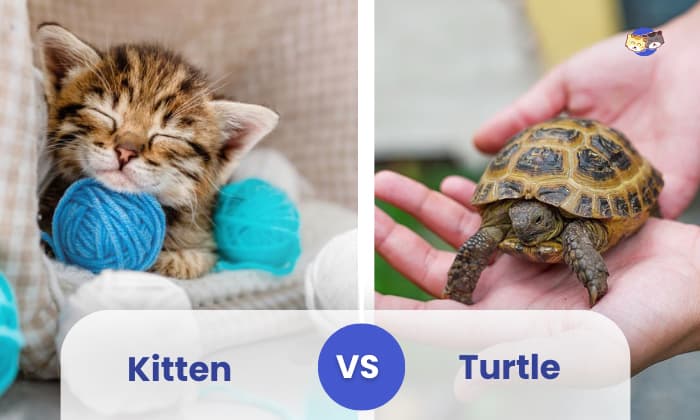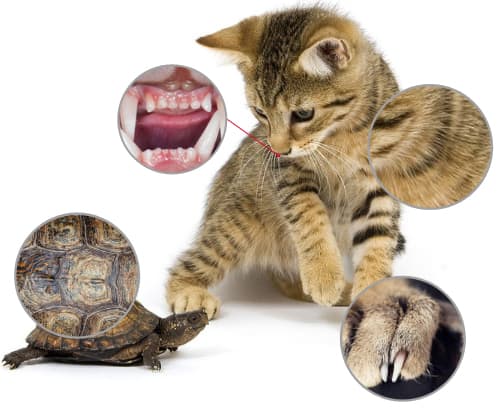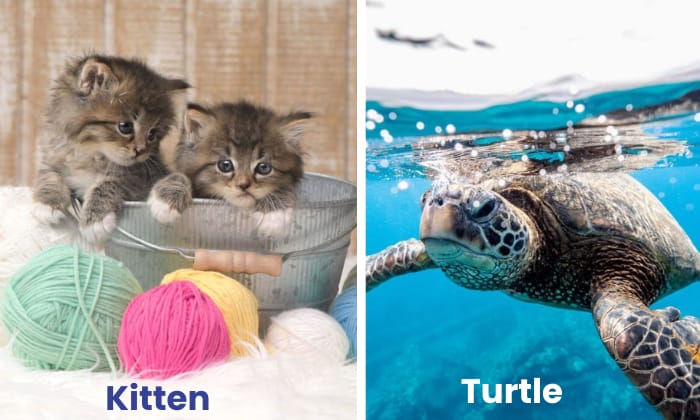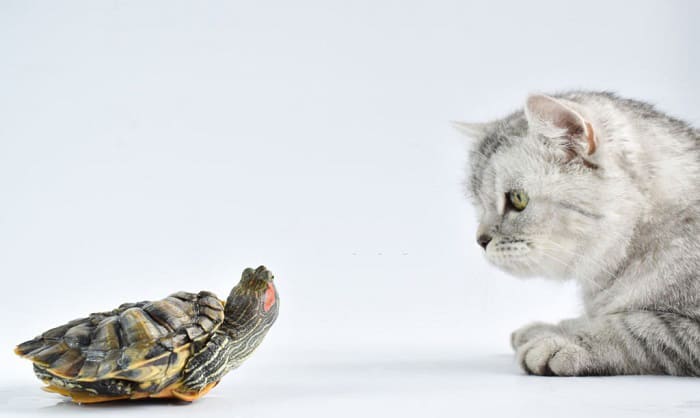The debate about which pet is better, kitten vs turtle, has been a topic of discussion for many pet lovers. Both have their unique qualities and appeal, but which one is the better pet for you?
Kittens are known for being cuddly, adorable, and affectionate, which is perfect if you want a cuddle buddy. However, turtles are ideal if you are introverted, just like the turtle itself.
In this article, we will explore the differences between these two and help you decide which one would make the perfect addition to your home.
Table of Contents
What Are They: Kitty and Turtle
1. Kittens
Kittens are young domesticated cats that are known for their playful and curious nature. When they are kittens, they seem very clingy and full of energy. But when they become cats, they usually need to have their space.
Cats are easy to take care of – they just need their food, water, and litter box. And maybe some playtime and cuddle when they feel like it.
2. Turtles
Turtles, on the other hand, are reptiles that come in various species and sizes. They are known for their hard shells and slow movement and can make fascinating and unique pets.
They are not as friendly as your fur baby, but the good news is they live longer than a usual cat.
Turtles require specialized equipment, including a tank, heating and lighting, and a balanced diet. They can be more low-maintenance in some ways, but require regular care and attention to thrive in captivity.
What Are Their Differences?
1. Physical characteristics
- Kitten – Kittens have a coat, which can be short or long and comes in a variety of colors and patterns. This coat helps to regulate their body temperature and acts as a skin protector. Their bodies are soft and flexible, with a tail that can be used for balance and communication.
Kittens have sharp teeth and retractable claws for grooming and playing. Not only that, but they also have a rough tongue responsible for their grooming behavior – removing dead fur, helping them drink water, and strip meat.
- Turtle – Turtles, on the other hand, have a hard shell that protects their body and internal organs. Their shells are made of bone and covered in a layer of keratin, the same material found in human hair and nails.
Turtles also have a beak-like mouths with no teeth, which they use to eat plants and prey. Unlike kittens, turtles have a rigid body structure that limits their movement.
In terms of sensory abilities, kittens have excellent eyesight and can see in low light conditions. They also have sensitive whiskers that help them navigate their environment and detect changes in air currents.
While turtles have improved eyesight and a keen sense of smell, they can detect scents and use this ability to find food and locate potential mates. Turtles can also see well underwater, which is helpful for finding prey and avoiding predators.
Another critical difference between kittens and turtles lies in their body temperature regulation.
Kittens are warm-blooded mammals, which means they can regulate their body temperature internally. Turtles are cold-blooded reptiles – they rely on external heat sources to regulate their body temperature.
2. Behavior
Kittens are social and playful animals that enjoy interacting with their owners and other cats.
However, turtles are not known for being particularly social or interactive pets. They are generally solitary animals that prefer to spend their time basking in the sun or swimming in their tanks.
While turtles can become accustomed to their owners and recognize them as food providers, they do not form the same emotional bond that cats do. Turtles are also not natural hunters and generally eat a herbivorous diet.
Cats enjoy grooming themselves. This behavior is essential for maintaining their hygiene. Turtles do not groom themselves but rather require regular cleaning to maintain their shells and skin.
One potential challenge with owning a cat is dealing with its scratching behavior. While scratching is a natural behavior for cats, it can be destructive to furniture and other household items.
Turtles do not have this kind of destructive behavior and generally require less attention in terms of managing their behavior. All they need (at most) are a good habitat and a balanced diet.
Pros and Cons of Having a Turtle or Kitten as a Pet
In this table, we have listed the possible pros and cons of getting a turtle or kitten as a pet:
1. Turtles
- Quiet animals
- Do not require constant attention.
- Don’t shed – which is much helpful if you don’t have any animal allergies.
- Need a much more specific habitat that suits them since they are cold-blooded animals.
- Picky eaters and only eat veggies and fruits.
- Have the tendency to bite especially when displeased.
- Might bore you as time passes by due to lack of connection.
- You might need to give them bigger space as they grow up.
2. Kittens
- Rather low maintenance – with only food, water, and litter box – you can take care of a cat.
- Have these moments of affection and amusement
- A cute pet
- The litter box needs constant cleaning.
- Their fur sheds a lot and might require you to clean these as well.
- Have the habit of scratching things – such as your favorite table.
- Can give you costly vet fees.
Care
1. For turtle
Take note that turtles are sensitive to temperature so you might need to follow specific temperatures for them to feel comfortable. In terms of feeding, turtles are known for being herbivores but might as well consult with a vet expert on turtle care.
The following are things you might need to consider included as part of their habitat:
- Tank with proper ventilation
- Swimming water
- Basking area
- Heat and lighting
2. For cat
Cats, on the other hand, do not need a specific habitat. It can be housed at the expense of your own home!
The only thing you need to consider is giving them nutritious food and drinking water. Although it’s also advisable to give them a trip to the vet from time to time for grooming and other check ups to monitor their health.
Of course, this includes spaying or neutering! Keeping a clean litter box is also one of their essentials.
Lifespan and Cost
Turtles can live longer than 20 years – and there is a good chance of them outliving you!
Therefore, taking care of turtles is more expensive than cats because you need to maintain their habitat, vet bills, and so on for much longer than cats.
Tips to Choose the Right Pet for You
Choosing the right pet for you requires ample introspection and consideration. The following factors are things you might need to consider before adopting a pet:
- Costs – Make sure that adopting and maintaining their needs are affordable.
- Spending time away from home – If you leave home occasionally, you might want to consider a pet that doesn’t mind your absence.
- Back-up caretaker for your pet – If you choose a pet that could outlive you, you might need to have someone who can take care of them once you pass away.
- Living changes – If there’s a sudden change, make sure that the pet you choose can adapt to those changes.
Frequently Asked Questions
Can kittens and turtles live together?
If you are wondering, “do cats and turtles get along?” The answer is yes! However, this is only applicable to adult turtles and domesticated cats.
Thus, yes, your kitty and turtle can live together – in fact, they can live together in harmony!
Do cats eat turtles? and how to protect turtle from cat?
Cats can eat turtles – baby turtles! This is when the turtle is tiny that cats can swallow them. But in general, no, cats cannot eat turtles.
However, you may have a bigger tank or cage for your turtle to keep it away from the cat. You may also put a lid over the cage to secure its safety.
Conclusions
We hope that this article, kitten vs turtle has helped you to have more additional insight about which pet to choose between kitten and tortoise, or if you are thinking of expanding your pet family – adding either one of them.
Remember that these are only the general summary of what you can get from each. You are responsible for learning which pet suits your taste, budget, and home environment.

I am Amy Sawy, a Doctor of Veterinary Medicine (DVM) graduate from the University of Kansas. y husband, Dr. Plummer, and I own a veterinary clinic in Phillipsburg, Kansas. In addition to my professional background, I am a devoted pet owner myself, with a household that includes dogs, rodents, and most notably, cats – a total of five felines in my home.
In 2020, I joined an organization as a professional writer, leveraging my experience and collaborating with my team to deliver the most valuable information for your cat’s care.















